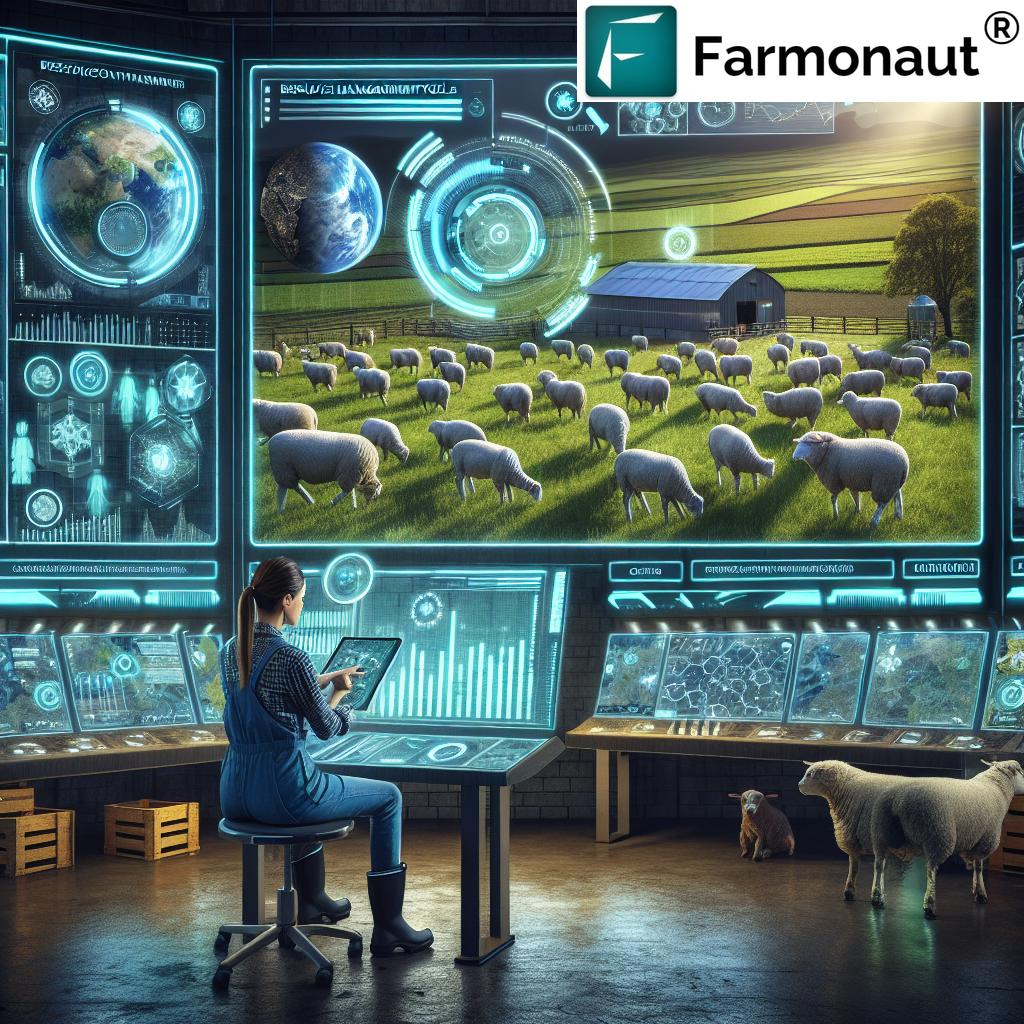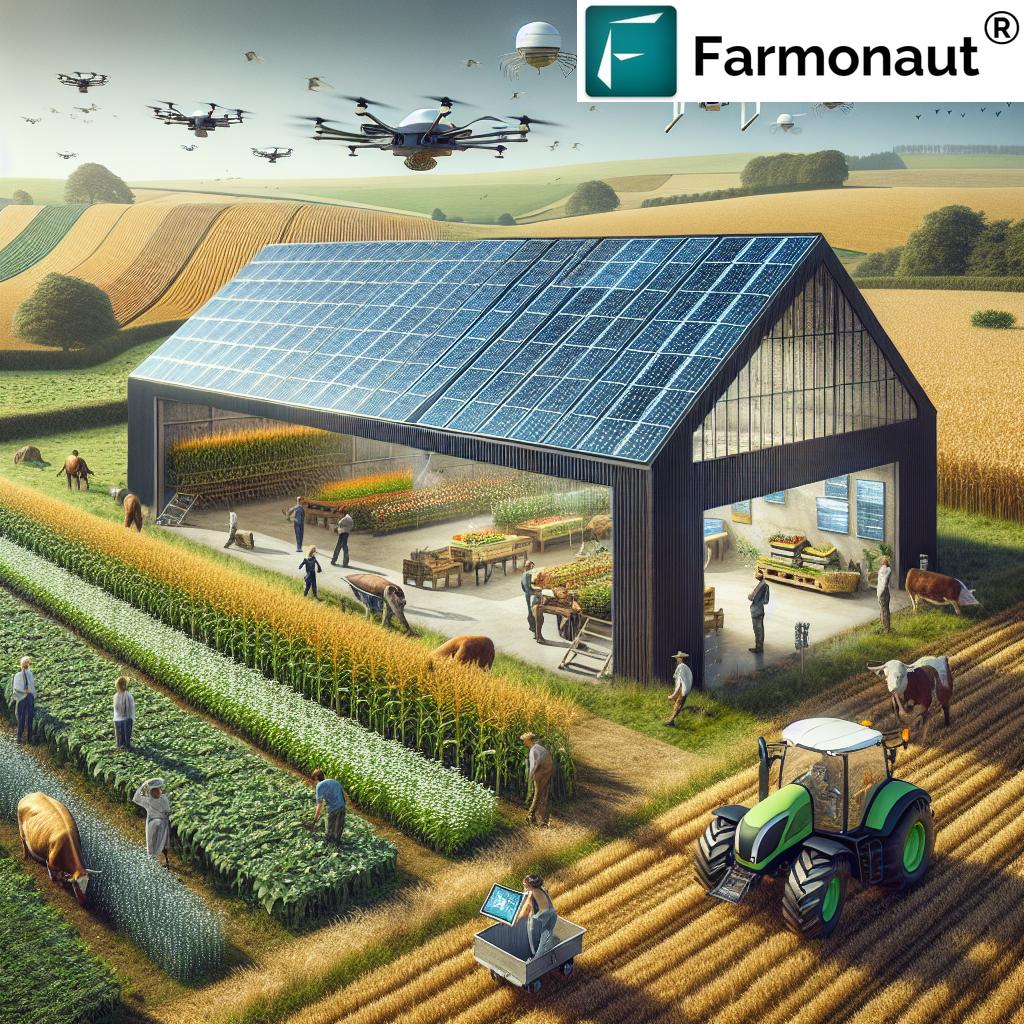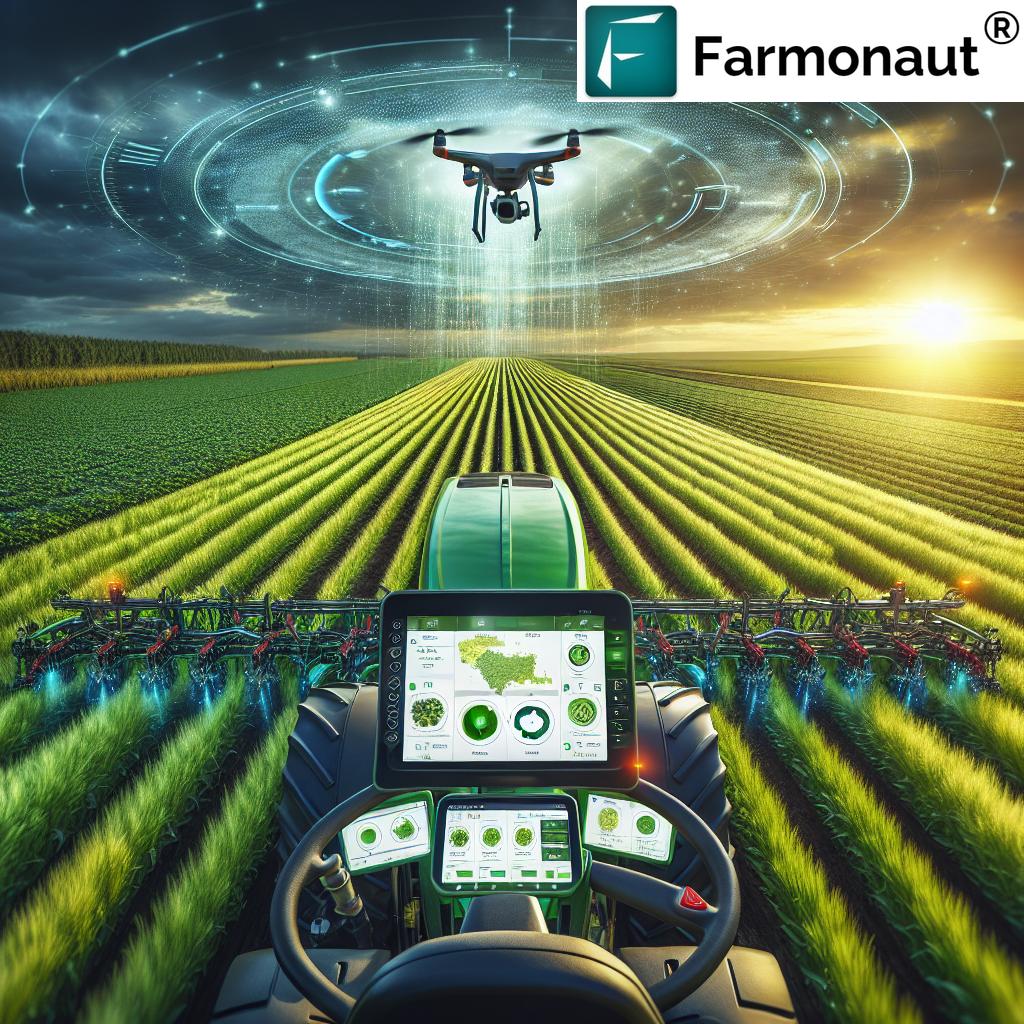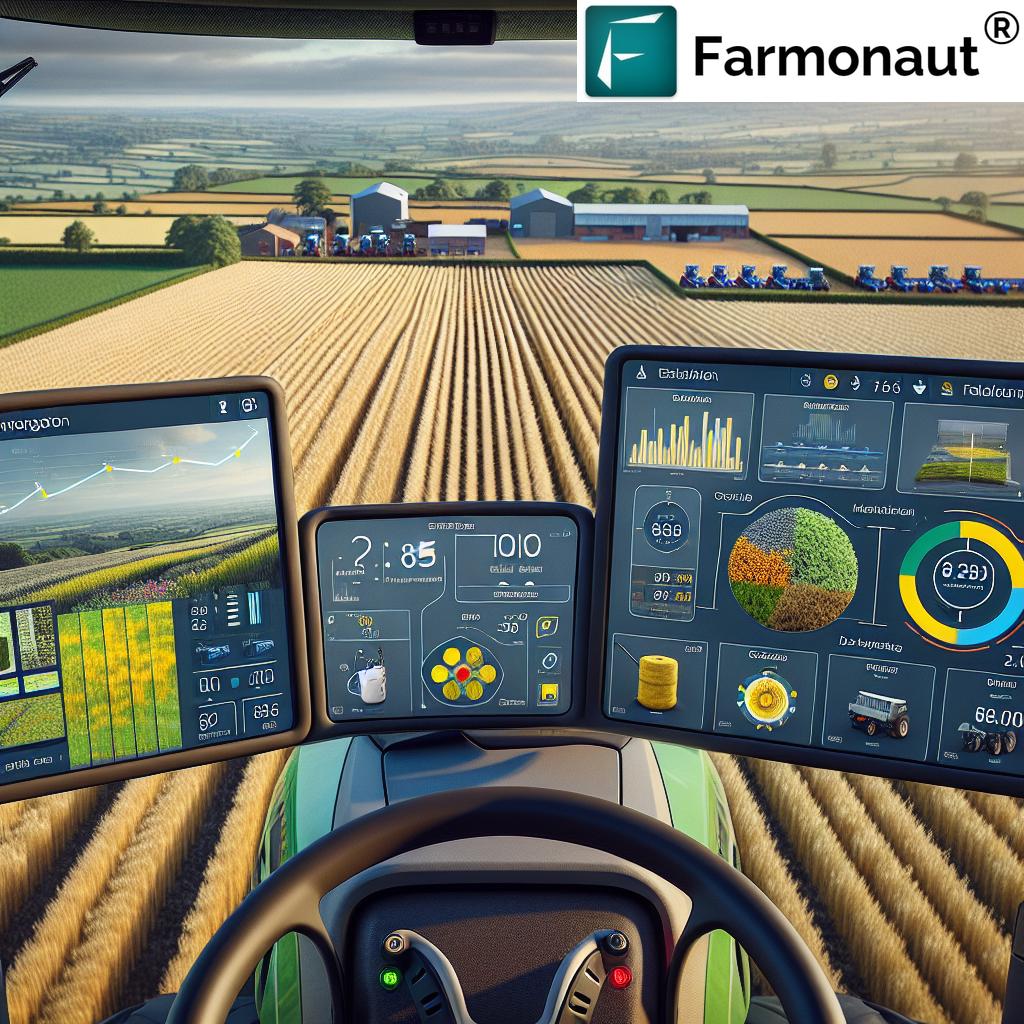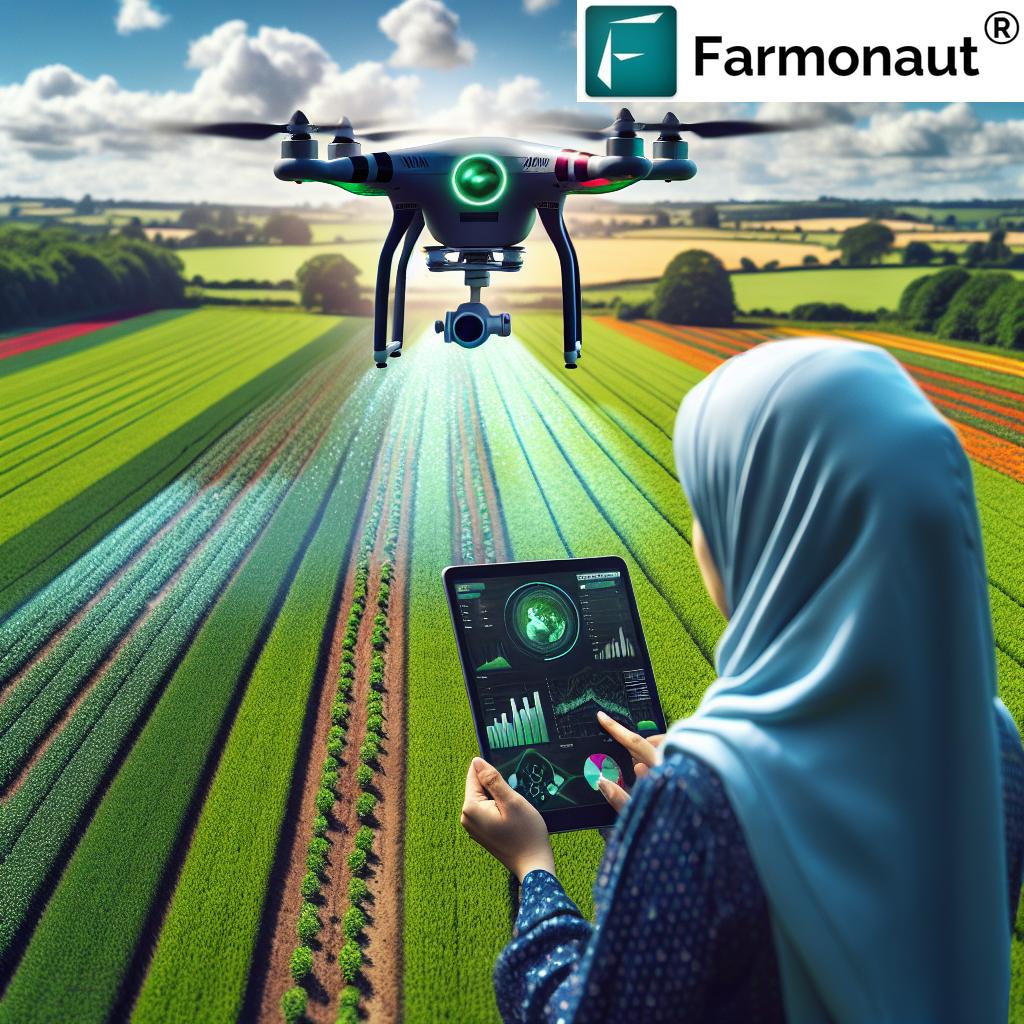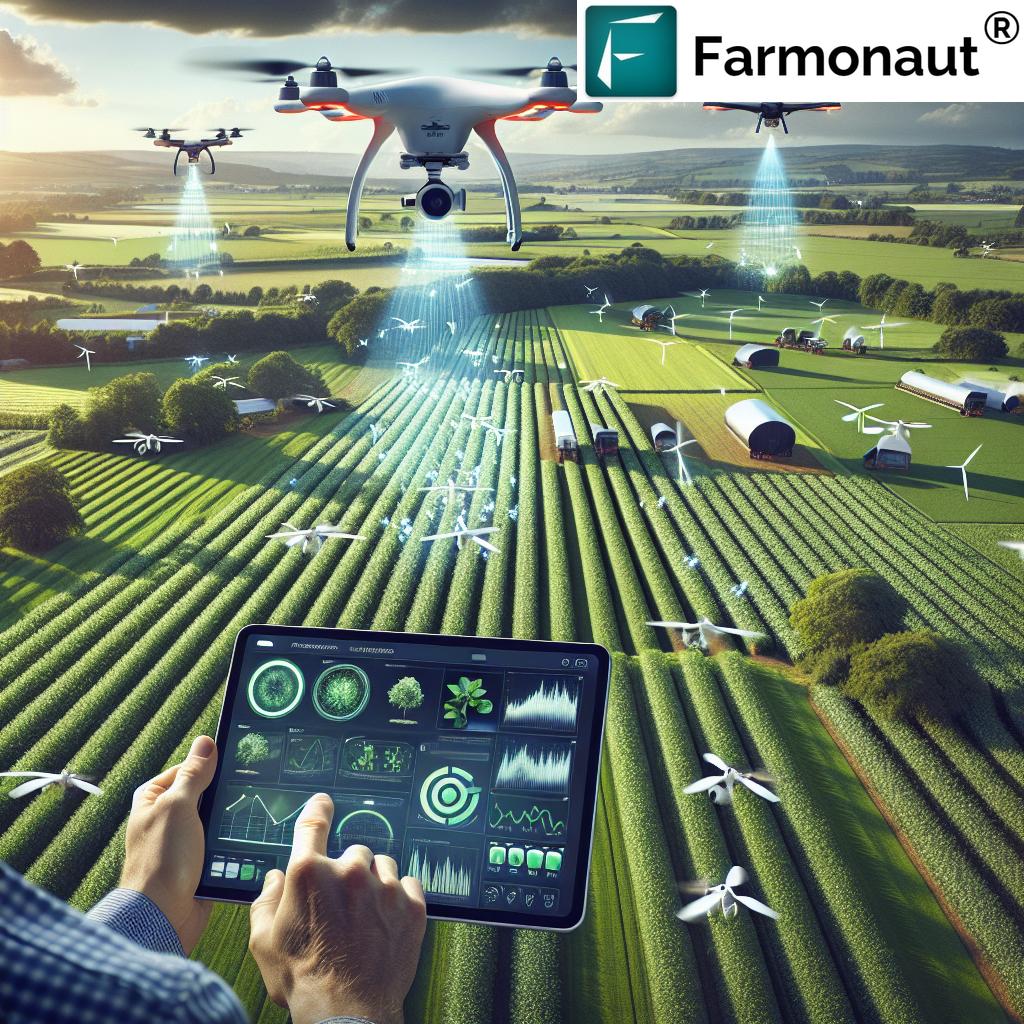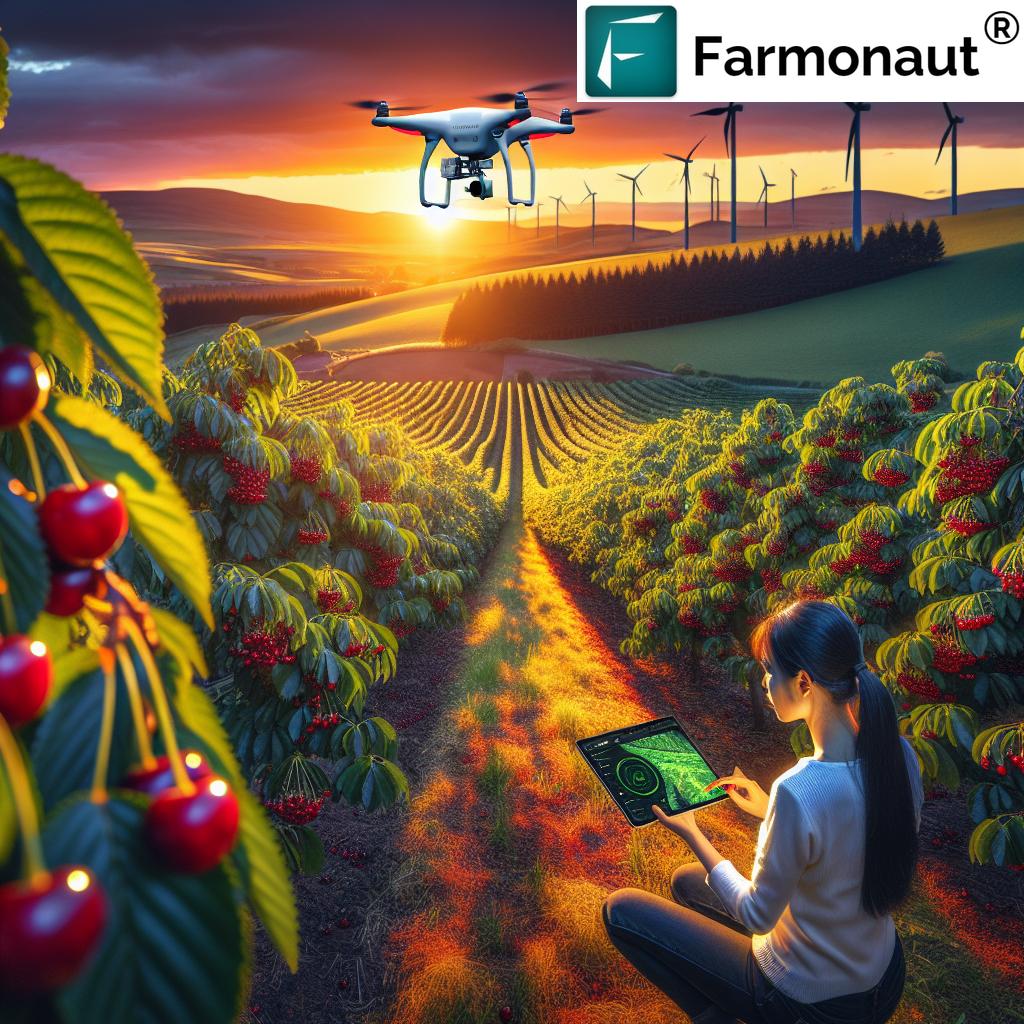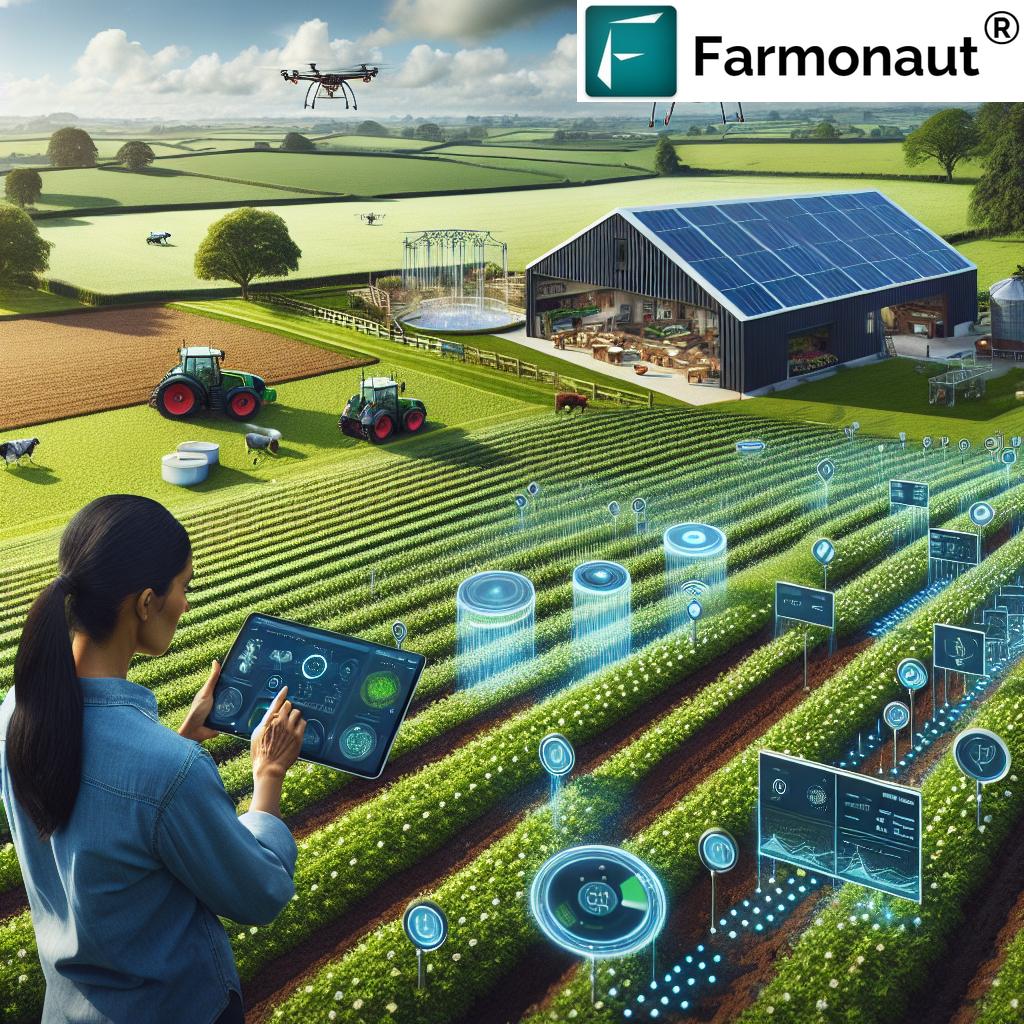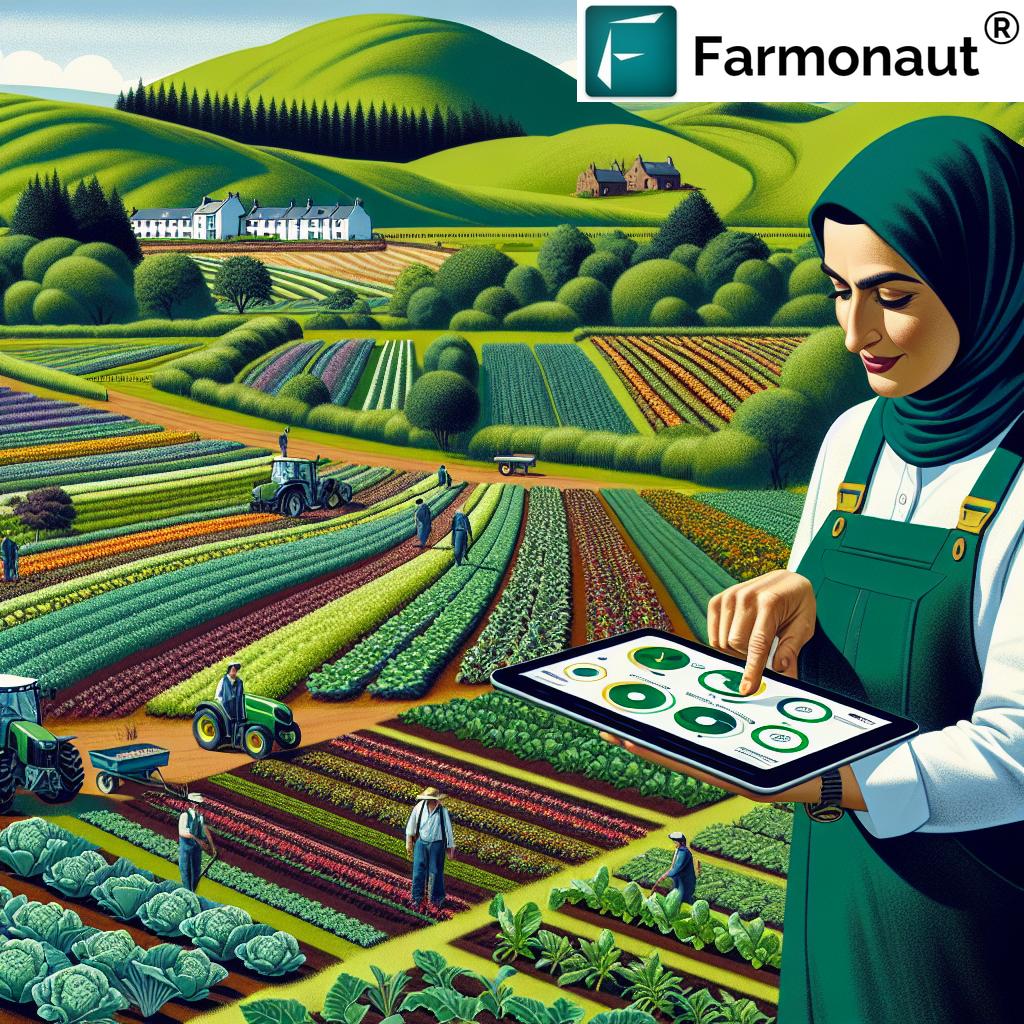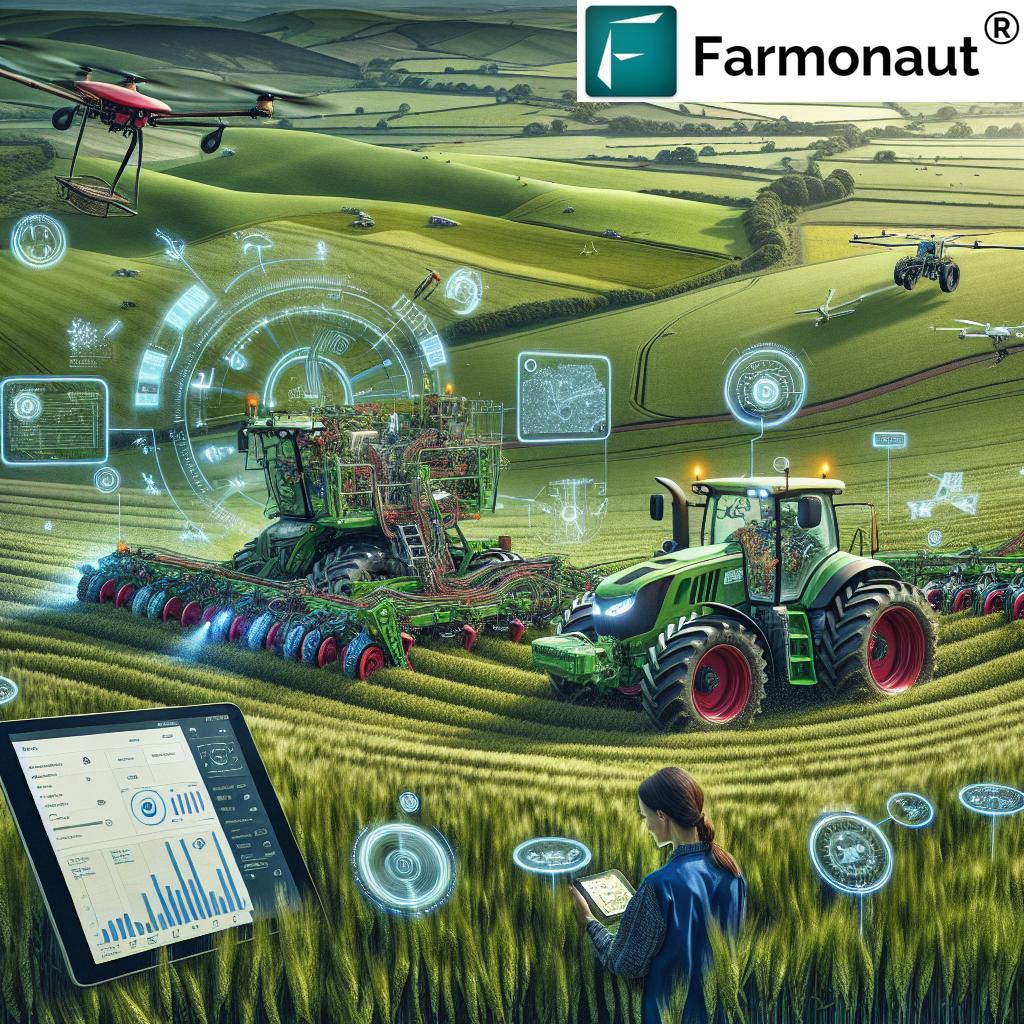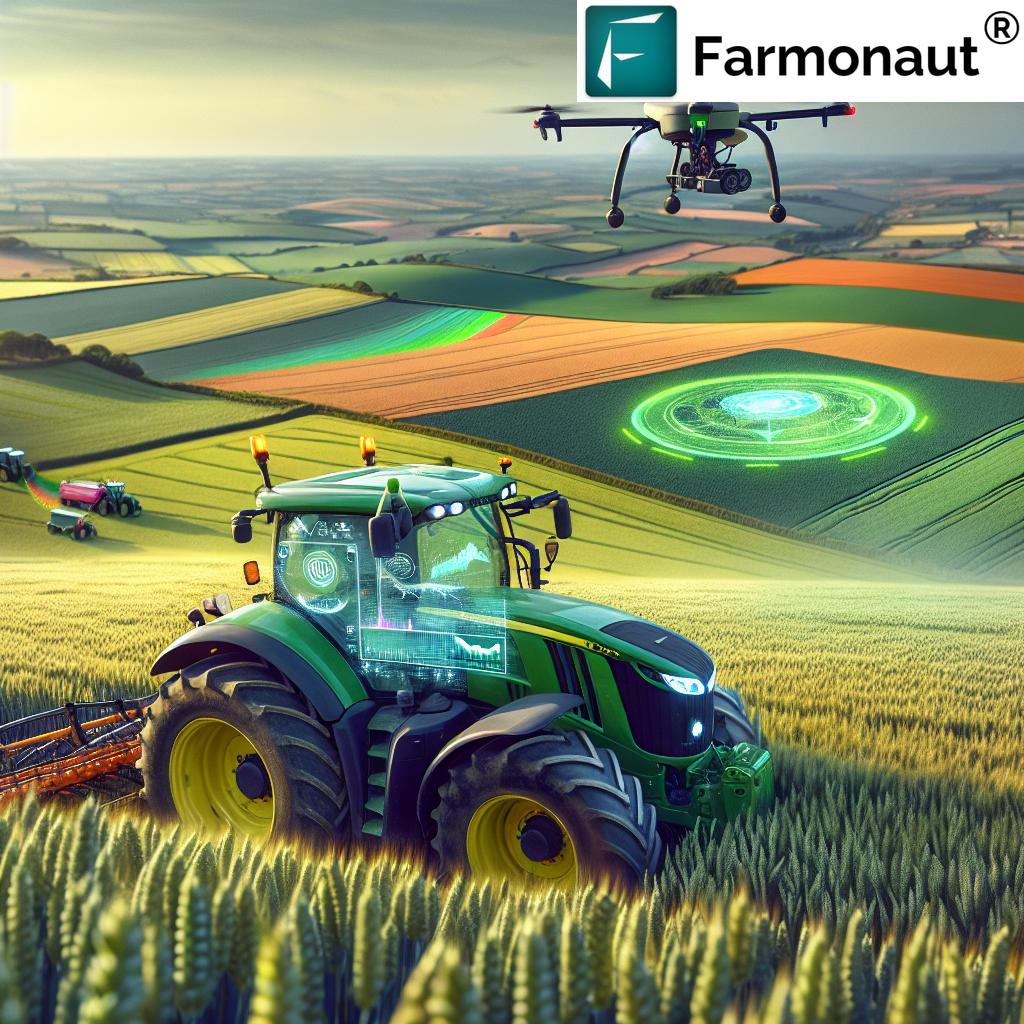Sustainable Land Management: Revolutionizing UK’s Rural Conservation with Eco-Friendly Farming Techniques
“Scotland’s organic farming sector grew by 35% between 2016-2021, covering over 324,000 hectares of agricultural land.”
In the ever-evolving landscape of agriculture, sustainable land management and organic farming practices are at the forefront of a revolution that’s reshaping the UK’s rural conservation efforts. As we delve into the world of eco-friendly farming techniques, we’ll explore how these innovative approaches are transforming not only our food production systems but also our relationship with the environment.
At Farmonaut, we’re committed to supporting this agricultural revolution through our advanced satellite-based farm management solutions. Our platform integrates cutting-edge technology with traditional farming practices, making precision agriculture accessible and affordable for farmers across the UK and beyond.
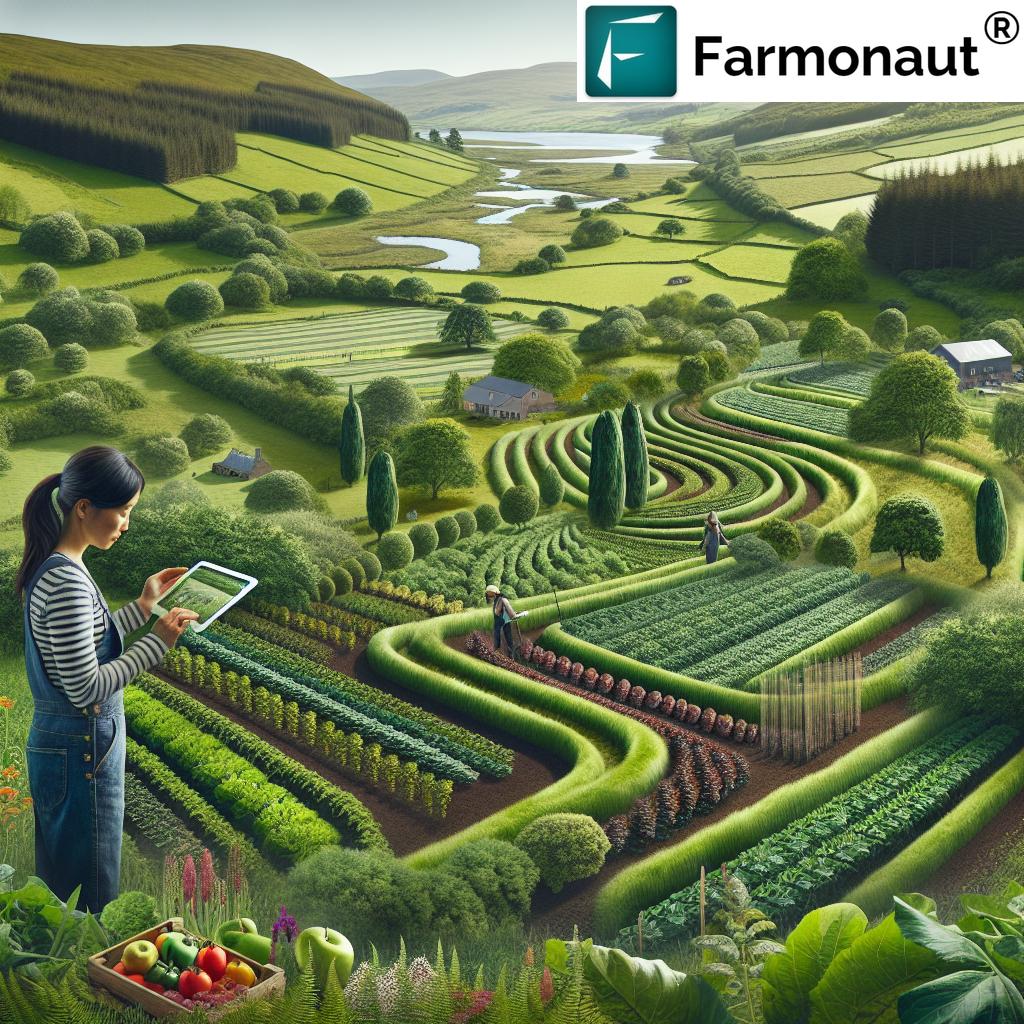
The Rise of Sustainable Agriculture in the UK
The UK, particularly Scotland, has seen a significant shift towards sustainable farming practices in recent years. This move is not just a trend but a necessary response to the growing challenges of climate change, soil degradation, and biodiversity loss. Sustainable land management encompasses a range of practices that aim to balance productivity with environmental stewardship, ensuring that our agricultural systems can continue to feed the nation while preserving our natural resources for future generations.
Key aspects of sustainable land management include:
- Conservation agriculture
- Organic farming practices
- Agro-ecological solutions
- Environmental land policies
- Sustainable agriculture technology
These approaches are not just theoretical concepts but are being actively implemented across the UK, revolutionizing rural resource management and agricultural estate management.
Conservation Agriculture: A Cornerstone of Sustainability
Conservation agriculture is a farming system that promotes minimum soil disturbance, permanent soil cover, and diversification of plant species. It’s an approach that’s gaining traction in the UK for its ability to improve soil health, reduce erosion, and enhance biodiversity.
At Farmonaut, we support conservation agriculture through our satellite-based crop health monitoring system. By providing real-time data on vegetation health and soil moisture levels, we enable farmers to make informed decisions about resource management, reducing the need for intensive tillage and excessive use of inputs.
Organic Farming: Growing Healthier Food, Healthier Soils
Organic farming has seen remarkable growth in the UK, particularly in Scotland. This approach to agriculture eschews synthetic fertilizers and pesticides in favor of natural alternatives, promoting soil health and biodiversity. The organic sector’s expansion reflects a growing consumer demand for food produced in harmony with nature.
Farmonaut’s Jeevn AI Advisory System plays a crucial role in supporting organic farmers. By analyzing satellite data and providing personalized advice, we help farmers optimize their organic practices, from crop rotation planning to pest management strategies.
Explore our satellite-based farm management solutions:
Agro-Ecological Solutions: Mimicking Nature’s Wisdom
Agro-ecology is an approach that applies ecological principles to agricultural systems. It emphasizes the importance of working with natural processes rather than against them. In the UK, this has translated into practices such as:
- Integrated pest management
- Intercropping
- Agroforestry
- Use of cover crops
These methods not only enhance biodiversity but also improve soil structure and fertility, leading to more resilient farming systems.
“Implementing hedgerows can increase biodiversity on farms by up to 40% and reduce soil erosion by 90%.”
Farmonaut’s platform supports agro-ecological approaches by providing detailed insights into field conditions. Our satellite imagery can help farmers identify areas suitable for hedgerows or agroforestry, maximizing the benefits of these practices.
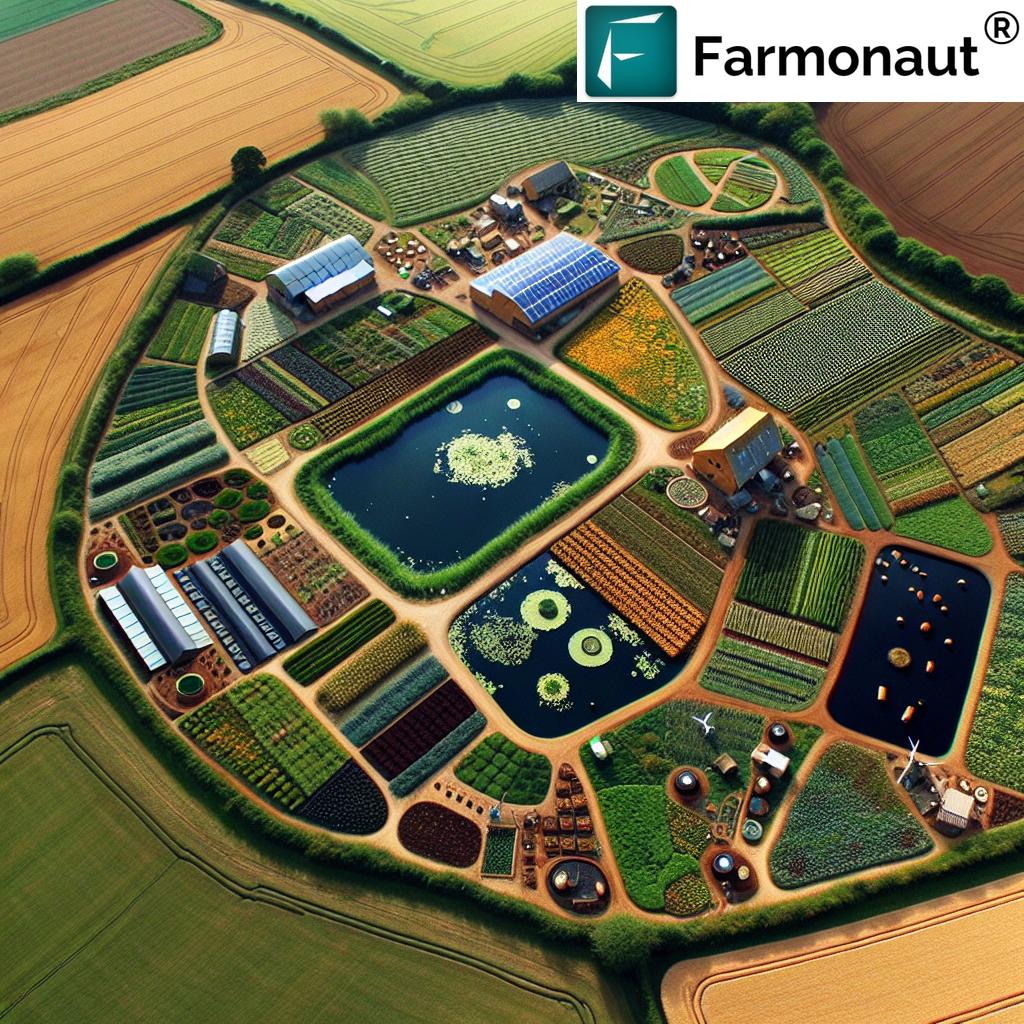
Environmental Land Policies: Shaping a Sustainable Future
The UK government has been instrumental in promoting sustainable land management through various environmental land policies. These include:
- Agri-environment schemes
- Sustainable farming incentives
- Conservation covenants
These policies provide financial incentives for farmers to adopt environmentally friendly practices, contributing to national conservation goals while supporting rural livelihoods.
At Farmonaut, we help farmers navigate these policies by providing accurate data on their land use and environmental impact. Our API and API Developer Docs enable integration with government systems, streamlining reporting and compliance processes.
Sustainable Agriculture Technology: The Digital Revolution in Farming
Technology plays a pivotal role in the transition to sustainable agriculture. From precision farming tools to AI-driven advisory systems, these innovations are helping farmers optimize resource use and reduce environmental impact.
Farmonaut is at the forefront of this technological revolution. Our platform combines satellite imagery, AI, and blockchain technology to provide comprehensive farm management solutions. Here’s how our technology supports sustainable agriculture:
- Real-time crop health monitoring for optimized resource use
- AI-driven personalized farm advice for improved decision-making
- Blockchain-based traceability for transparent and sustainable supply chains
- Carbon footprint tracking for environmental impact assessment
Challenges and Opportunities in Implementing Sustainable Practices
While the benefits of sustainable land management are clear, implementing these practices comes with its own set of challenges. These include:
- Initial costs of transitioning to new farming methods
- Knowledge gaps in implementing complex ecological systems
- Market uncertainties for new, sustainable products
- Balancing productivity with environmental goals
However, these challenges also present opportunities for innovation and growth. Farmonaut’s solutions are designed to address many of these issues, providing farmers with the tools and knowledge they need to successfully transition to sustainable practices.
Certification Standards: Ensuring Quality and Trust
Certification standards play a crucial role in the sustainable agriculture landscape. They provide consumers with assurance about the environmental and ethical credentials of their food, while giving farmers a framework for implementing sustainable practices.
In the UK, key certification standards include:
- Soil Association Organic Standard
- Red Tractor Assurance
- LEAF Marque
Farmonaut’s blockchain-based traceability solutions support these certification processes by providing transparent, verifiable data on farming practices and supply chains.
Market Trends: Growing Demand for Sustainable Products
The market for sustainably produced food is growing rapidly in the UK. Consumers are increasingly aware of the environmental impact of their food choices and are willing to pay a premium for products that align with their values.
This trend presents a significant opportunity for farmers adopting sustainable practices. Farmonaut’s platform helps farmers capitalize on these market trends by:
- Providing data to support sustainability claims
- Enabling efficient production of high-quality, sustainable crops
- Facilitating connections between farmers and eco-conscious consumers through transparent supply chains
The Role of Agro-Forestry in Sustainable Land Management
Agro-forestry, the practice of integrating trees and shrubs into agricultural systems, is gaining recognition as a powerful tool for sustainable land management. In the UK, this approach is being adopted to:
- Enhance biodiversity
- Improve soil health
- Provide additional income streams for farmers
- Sequester carbon and mitigate climate change
Farmonaut’s satellite imagery and AI analysis can help farmers identify optimal locations for agro-forestry systems and monitor their growth and impact over time.
Reducing Synthetic Fertilizers: A Key Step Towards Sustainability
The overuse of synthetic fertilizers has been a significant contributor to environmental pollution and soil degradation. Sustainable land management practices aim to reduce reliance on these inputs by:
- Promoting the use of organic fertilizers
- Implementing crop rotation to naturally replenish soil nutrients
- Utilizing cover crops to fix nitrogen and improve soil structure
Farmonaut’s Jeevn AI Advisory System helps farmers optimize their fertilizer use by providing precise recommendations based on real-time crop and soil data.
Promoting Biodiversity Through Hedgerows
Hedgerows are a traditional feature of the UK countryside that are making a comeback in sustainable farming systems. These linear strips of trees and shrubs offer numerous benefits:
- Habitat for wildlife, including pollinators
- Natural pest control
- Wind protection for crops
- Prevention of soil erosion
Farmonaut’s platform can help farmers plan and monitor hedgerow implementation, ensuring they maximize the ecological and agricultural benefits of these important landscape features.
Water Conservation in Sustainable Agriculture
Water management is a critical aspect of sustainable land management, especially in the face of climate change. Sustainable water conservation practices include:
- Precision irrigation systems
- Rainwater harvesting
- Use of drought-resistant crop varieties
Farmonaut’s soil moisture monitoring capabilities help farmers optimize their water use, reducing waste and ensuring crops receive the right amount of water at the right time.
The Future of Food Production: Balancing Productivity and Conservation
As we look to the future, the challenge of feeding a growing population while protecting our planet becomes increasingly urgent. Sustainable land management practices offer a path forward, allowing us to increase food production while minimizing environmental impact.
At Farmonaut, we’re committed to supporting this vision of sustainable agriculture. Our technology empowers farmers to make data-driven decisions that benefit both their bottom line and the environment. By leveraging satellite imagery, AI, and blockchain, we’re helping to create a more resilient and sustainable food supply chain for future generations.
Comparison of Sustainable Land Management Practices
| Practice | Environmental Benefits | Economic Benefits | Implementation Challenges | UK Adoption Rate | Farmonaut Solution Support |
|---|---|---|---|---|---|
| Conservation Agriculture | Soil health improvement, reduced erosion | Lower input costs, improved yield stability | Initial yield reduction, specialized equipment needed | ~25% | Crop health monitoring, soil moisture tracking |
| Organic Farming | Increased biodiversity, reduced pollution | Premium prices, lower input costs | Certification process, potential yield decrease | ~3% | AI advisory for organic pest management, traceability solutions |
| Agroforestry | Carbon sequestration, habitat creation | Diversified income streams | Long-term investment, complex management | ~1% | Satellite imagery for tree health monitoring, carbon footprint tracking |
| Precision Agriculture | Reduced chemical use, optimized resource use | Increased yield, reduced input costs | High initial technology costs, data management | ~15% | Real-time crop monitoring, AI-driven recommendations |
| Cover Cropping | Improved soil structure, reduced erosion | Enhanced soil fertility, pest suppression | Additional seed costs, management complexity | ~20% | Crop rotation planning, soil health analysis |
FAQ: Sustainable Land Management in the UK
Q: What is sustainable land management?
A: Sustainable land management refers to practices that balance agricultural productivity with environmental conservation, ensuring long-term food security while protecting natural resources.
Q: How does organic farming contribute to sustainability?
A: Organic farming promotes soil health, biodiversity, and reduced pollution by avoiding synthetic pesticides and fertilizers, contributing to more sustainable agricultural systems.
Q: What role does technology play in sustainable agriculture?
A: Technology, like Farmonaut’s satellite-based solutions, enables precision farming, efficient resource use, and data-driven decision-making, all crucial for sustainable agriculture.
Q: How can farmers transition to more sustainable practices?
A: Farmers can transition by adopting practices like conservation tillage, crop rotation, and integrated pest management, often supported by government incentives and technological tools.
Q: What are the economic benefits of sustainable farming?
A: Sustainable farming can lead to reduced input costs, improved soil health for long-term productivity, and access to premium markets for environmentally friendly products.
Conclusion: A Sustainable Future for UK Agriculture
As we’ve explored throughout this blog, sustainable land management and eco-friendly farming techniques are not just trends but necessities for the future of UK agriculture. From conservation agriculture to precision farming powered by Farmonaut’s technology, these practices offer a path to a more resilient, productive, and environmentally friendly food system.
By embracing these sustainable approaches and leveraging innovative agri-tech solutions, UK farmers can lead the way in creating a food production system that not only feeds the nation but also protects and nurtures our precious natural resources for generations to come.
At Farmonaut, we’re proud to be part of this agricultural revolution, providing farmers with the tools and insights they need to make sustainable farming a reality. Together, we can build a future where agriculture and conservation go hand in hand, ensuring food security while preserving the beauty and biodiversity of the UK’s rural landscapes.





